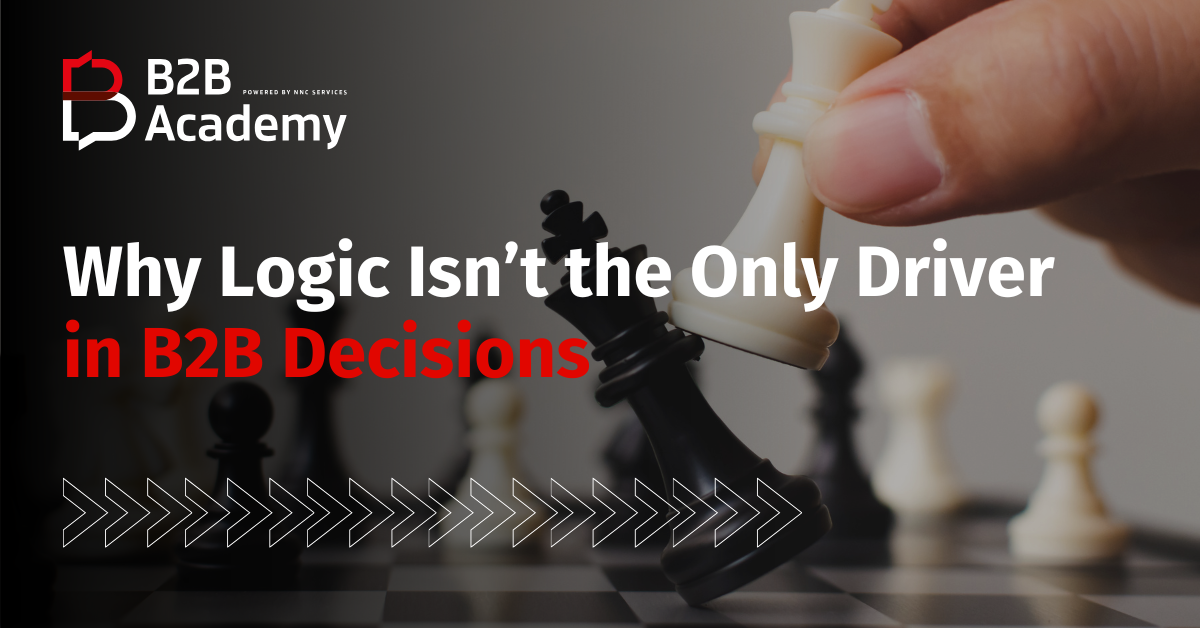When most people think about B2B buying, they envision rational spreadsheets, detailed ROI calculations, and lengthy committee meetings. Logic and data, right?
Not entirely. Yes, logic plays a big role. But emotions, trust, and perception influence decisions more than many professionals want to admit. If you’ve ever wondered why a buyer chose a more expensive supplier or stuck with a vendor despite issues, the answer often lies in the emotional side of decision-making.
So let’s unpack this together. By the end, you’ll see why logic is only one piece of the B2B puzzle.
The Myth of Purely Rational B2B Buying
B2B decisions are often presented as purely rational, with buyers carefully weighing numbers and outcomes. But if that were entirely true:
- Why do buyers sometimes stick with a vendor they personally like, even when alternatives are cheaper?
- Why do reputation and trust consistently rank above price in surveys?
- Why do case studies and success stories sway opinions more than technical spec sheets?
The truth: buyers are human. And humans make decisions through a mix of reason and emotion.
Where Emotions Sneak Into B2B
You may think your buyers are comparing only features and pricing, but emotional factors show up at every stage of the buying process.
- Trust in the Vendor
- Does the company seem dependable? Are promises believable? Trust reduces risk, and in B2B, risk feels personal; nobody wants to be blamed for a poor decision.
- Confidence in the Relationship
- Buyers ask themselves: “Do I feel supported by this partner?” The answer often outweighs technical differences.
- Personal Reputation
- Choosing a vendor isn’t just about the company’s success; it’s about the buyer’s own credibility inside their organization. Picking a trusted supplier feels safer than choosing an unknown, even if the numbers look better on paper.
- Brand Perception
- A strong, respected brand signals reliability. Even in B2B, reputation carries emotional weight.
- Security and Risk Avoidance
- Buyers don’t just want results, they want assurance they won’t get blamed if something goes wrong. A safe choice often beats a bold one.
Why This Matters for You
If you’re in sales or marketing, recognizing the role of emotion is crucial. Logic gets you into the conversation, but emotion often closes the deal.
Ask yourself:
- Are you showing empathy in your interactions, or just listing features?
- Does your brand come across as trustworthy and approachable, not just competent?
- Are your case studies telling human stories, or only sharing numbers?
Practical Ways to Address Both Logic and Emotion
Balancing logic and emotion means building a message that speaks to the head and the heart. Here’s how you can do it:
- Lead with Value, Reinforce with Proof
- Show how your solution solves a business problem, then back it up with data, testimonials, and case studies.
- Highlight Buyer Success Stories
- Numbers are useful, but stories resonate. A narrative about how a buyer succeeded thanks to your solution makes your offer feel real and relatable.
- Build Confidence Through Transparency
- Be honest about limitations or challenges. Paradoxically, acknowledging weaknesses increases trust.
- Invest in Reputation
- Encourage satisfied clients to leave reviews, publish thought leadership, and participate in industry conversations. A strong reputation gives buyers emotional reassurance.
- Train Sales Teams in Empathy
- Listening skills and understanding buyer pressures matter as much as technical product knowledge.
The Questions Buyers Are Really Asking
Behind every formal RFP or structured evaluation, buyers are often asking themselves silent questions such as:
- “Will choosing this vendor make me look smart or risky?”
- “If something goes wrong, can I trust them to help me fix it?”
- “Will my boss and colleagues approve of this choice?”
- “Does this vendor understand what I’m up against?”
These are emotional questions, even if they’re not on the official scorecard.
Balancing Reason and Emotion in Your Strategy
So, what does this mean for your approach? Think of logic and emotion as partners, not opposites. Logic proves your offer works. Emotion reassures buyers they’re making the right choice.
When you shape your messaging, content, and sales interactions, ask yourself: Are we addressing both?
B2B buying isn’t a cold calculation. It’s a mix of logic, data, and very human emotions. If you want to win more deals, don’t just show prospects why your solution makes sense. Show them why it feels right, too.
Because at the end of the day, your buyers may wear professional titles, but they’re still people, people who want to feel confident, respected, and safe in their decisions.




